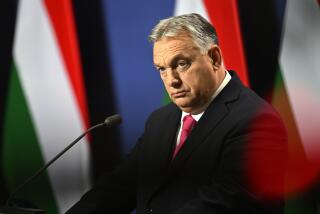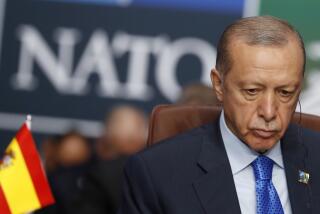EUROPE : EC Treaty May Need More Than a Danish OK : Doubts on unity persist. Europe needs a ‘basic rethink,’ economist says.
BRUSSELS — Denmark will have another chance to vote for European unity Tuesday, but it may be too late to put the movement back on track anytime soon.
Fundamental doubts about the European Community’s march to political and economic unity--common European defense and foreign policies, a single EC currency--have spread to all the Community’s major countries. Germany is worried about losing its currency, France about its identity and Britain about its sovereignty.
In this atmosphere, a yes vote in Denmark might not be enough to give EC political leaders the will and the popular support they need to press toward unity. In fact, a no vote, while dealing a short-term blow to the cause of unity, could have therapeutic value.
“What Europe needs is a basic rethink of where it’s going,” said Jim Rollo, director of economics for the Royal Institute of International Affairs in London. “A no vote might promote that.”
It was Denmark’s initial no vote 11 months ago that precipitated Europe’s identity crisis. By a scant 50,000 votes out of 4 million cast, Danes refused to ratify the treaty on political and monetary union, negotiated by the 12 EC leaders in the Dutch town of Maastricht.
Without ratification by all 12 EC members, the treaty would not take effect. So the other 11 EC nations agreed to give Danes a second chance to vote, this time on a package that would let Denmark stay out of the treaty’s most important provisions: a single currency for EC nations and common EC defense and immigration policies.
Campaigning for the eviscerated Maastricht Treaty are all of Denmark’s major political parties, its business community and its labor unions. Recent polls show that a majority of Danes favor the watered-down treaty.
But polls before last year’s referendum also pointed toward ratification. Now a ragtag collection of activists--environmentalists, former Communists and right-wing populists--is warning voters that the treaty will drag Denmark into a centralized Europe with its own military and police forces.
Even with Danish support, the treaty would not be home free. In Britain, where Parliament has the final say, Maastricht’s opponents are making life miserable for Prime Minister John Major, a champion of European integration.
One of Major’s great triumphs at Maastricht was to win the right for Britain to steer clear of the treaty’s “social charter”--a series of provisions guaranteeing EC workers such benefits as maximum 48-hour work weeks. But two weeks ago, Parliament forced Major to swallow an amendment that would, on its face, put Britain back into the social charter.
Treaty opponents say the amendment makes it impossible for Britain to ratify the same treaty that the rest of the EC has ratified. The government says otherwise: The amendment applies only to the British enabling legislation, not to the treaty itself.
The government still hopes for final parliamentary approval this summer or fall. Even so, some of the treaty’s most far-reaching provisions may be substantially delayed or even buried.
In particular, the effort to establish a common EC currency was battered by last September’s turmoil in European currency markets. EC disarray over the war in the former Yugoslav federation has made the promise of a common foreign policy something of a joke.
Beyond ensnarling the Maastricht ratification process, last year’s no vote in Denmark unleashed an EC-wide tide of sentiment against European unity. Voters in France approved the treaty by a bare 51% to 49%. In Germany, public opinion polls showed majority opposition to exchanging the German mark for a common EC currency.
Legislative activity at the EC ground to a virtual standstill, for fear of further upsetting Europe’s electorate. The EC’s executive commission has proposed little more this year than an economic stimulus package that is mostly a repackaging of previous proposals.
By itself, ratification of the Maastricht Treaty will not turn the EC around. A commission official said that must wait for the end to the recession that grips many EC nations and for the end of the war in the Balkans.
WHAT THE MAASTRICHT TREATY DOES . . .
* Establishes procedures for a common currency to replace EC nations’ individual currencies by 1999.
* Establishes a “social charter” that guarantees good working conditions in 11 EC nations (Britain chose to abstain).
* Allows a majority of EC states to make policy in five areas--transportation, environment, education, regional assistance and capital flows--where unanimity is now required.
* Empowers the elected European Parliament, which now has little real authority, to veto EC legislation.
. . . AND WHAT IT DOES NOT
* Create a single EC market in which goods, services, people and money travel unhindered across borders between EC nations. (The single market is already largely in place.)
* Require EC members to adopt common foreign and defense policies. (The treaty establishes procedures to make this possible but does not force the member nations to reach agreement on particular issues.)
The European Community: Belgium, Britain, Denmark, France, Germany, Greece, Ireland, Italy, Luxembourg, the Netherlands, Portugal and Spain
More to Read
Sign up for Essential California
The most important California stories and recommendations in your inbox every morning.
You may occasionally receive promotional content from the Los Angeles Times.










